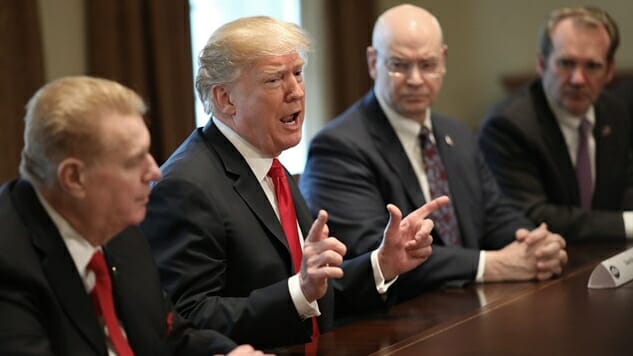New Polls: Dems Actually Have a Decent Chance to Take Back the Senate in November
Photo courtesy of Getty
Over the past few months, amid GOP retirements and a general sickening of the country to all things Trump, Democrats chances of taking back the House of Representatives have gone from “iffy” to “likely.” At this point, it would actually be an enormous disappointment if they failed, even considering a gerrymandered national map. But the Senate has always been a stickier wicket—regardless of how blue the impending seems to shade, the fact remains that Republicans are really only defending two hotly contested seats, while Democrats have to defend ten seats in states that Trump carried. This still leaves Democrats a mathematical chance, since the current composition is 51-49 for Republicans (two of the 49, Bernie Sanders and Angus King, are independents who caucus with Dems, for the record), but it always looked like quite a longshot.
On Friday, however, Five Thirty Eight ran the numbers and told us…well, there’s still a chance. Here’s why:
—In one of the two up-for-grabs Republican seats, the Democrat has a clear lead. This is in Tennessee, which Paste reported the other day, where the right to replace retiring Sen. Bob Corker has seen former Governor Phil Bredesen (the D) take a ten-point lead over Marsha Blackburn. There’s a lot of time left, and more polling is needed, but if all the other incumbents won and only this seat flipped, it would be enough for a 50-50 tie.
—But it may not be the only one. In Arizona, where Republican Sen. Jeff Flake is retiring, the race is already classified as a “toss-up.” A few primaries have yet to be decided, but there’s an additional wrinkle here—if John McCain’s health forces him to retire before May 30, it would trigger a second Senate election. And if both seats in the state are up for grabs, it increases the likelihood that a wingnut like Sheriff Joe Arpaio will represent the GOP in one election, and thereby increases the likelihood of another flip.
—Then there’s Beto O’Rourke in Texas, who has Ted Cruz in his sights. The whole thing still looks very unlikely, but O’Rourke has raised a ton of money (much of it likely outside Texas), and may have a shadow of a prayer. But still, it’s Texas—best not to get one’s hopes up.
—The Nevada race, as it has for a while, looks quite good for Democrats—everyone hates Dean Heller, he might be primaried from the right, and even if he’s not, a March poll showed Democrat Jacky Rosen already holding a lead.
So those are the five big chances for Democrats, and if they took just two of those seats, they would hold a 51-49 edge.
Of course, that ignores the ten seats they’re defending in Trump country. And there was some particularly bad news in one of those races, where former Florida Gov. Rick Scott, a Republican, decided to throw his hat in the ring against incumbent Dem Bill Nelson. As I wrote earlier this week, that’s a rare piece of good news for Republicans in a rough cycle, because Scott is actually respectable and well-liked. Already, polls indicate a tight race with a very slight early edge to Nelson.
And there are other minefields too—Claire McCaskill is neck-and-neck with her challenger in Missouri, Joe Donnelly will have a fight against the GOP primary winner in Indiana, Heidi Heitkamp is vulnerable in North Dakota, and even pseudo-Democrat Joe Manchin could have trouble in West Virginia.
And yet, despite the many chances for defeat, it’s possible that all the close races could be taken care of with a blue wave. If that transpires, Democrats actually have a very good chance to take both chambers. It would have been unthinkable just months ago, and the fact that there’s a chance speaks to the momentum the party has gathered in the past year.







































